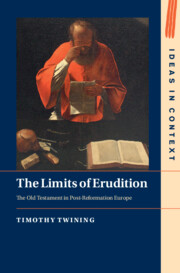
-
Select format
-
- Publisher:
- Cambridge University Press
- Publication date:
- 05 December 2024
- 12 December 2024
- ISBN:
- 9781009460965
- 9781009460958
- Dimensions:
- (229 x 152 mm)
- Weight & Pages:
- 0.664kg, 356 Pages
- Dimensions:
- Weight & Pages:
- Subjects:
- Area Studies, History of Ideas, European History after 1450, History, European Studies, History of Ideas and Intellectual History
- Series:
- Ideas in Context (155)
You may already have access via personal or institutional login- Subjects:
- Area Studies, History of Ideas, European History after 1450, History, European Studies, History of Ideas and Intellectual History
- Series:
- Ideas in Context (155)
Book description
The history of early modern biblical scholarship has often been told as a teleological narrative in which a succession of radical thinkers dethroned the authority of the sacred word. This book tells a very different story. Drawing on a mass of archival sources, Timothy Twining reconstructs the religious, cultural, and institutional contexts in which the text of the Old Testament was considered and contested throughout post-Reformation Europe. In so doing, this book brings to light a vast array of figures from across the confessional spectrum who invested immense energy in studying the Bible. Their efforts, it shows, were not disinterested, but responded to pressing contemporary concerns. The Limits of Erudition employs a novel conceptual framework to resurrect a world where learning mattered to inquisitors and archbishops as much as to antiquaries, and in which the pursuit of erudition was too important to be left to scholars.
Awards
Short-listed, 2025 First Book Prize, Ecclesiastical History Society
Reviews
‘This is a landmark work, written with great lucidity and based on an extraordinary command of the documentary evidence contained in archives all over Europe. Everyone interested in the history of knowledge in early modern Europe will benefit from reading this book.’
Sir Noel Malcolm - University of Oxford
‘The Limits of Erudition is a superlative book - one of the best and most important I've ever read. It is astonishingly rich in every respect, from its mastery of archival detail to the sweep of its gripping and exciting narrative.’
Thomas Roebuck - University of East Anglia
Contents
Metrics
Altmetric attention score
Full text views
Full text views help Loading metrics...
Loading metrics...
* Views captured on Cambridge Core between #date#. This data will be updated every 24 hours.
Usage data cannot currently be displayed.
Accessibility standard: Unknown
Why this information is here
This section outlines the accessibility features of this content - including support for screen readers, full keyboard navigation and high-contrast display options. This may not be relevant for you.
Accessibility Information
Accessibility compliance for the PDF of this book is currently unknown and may be updated in the future.

